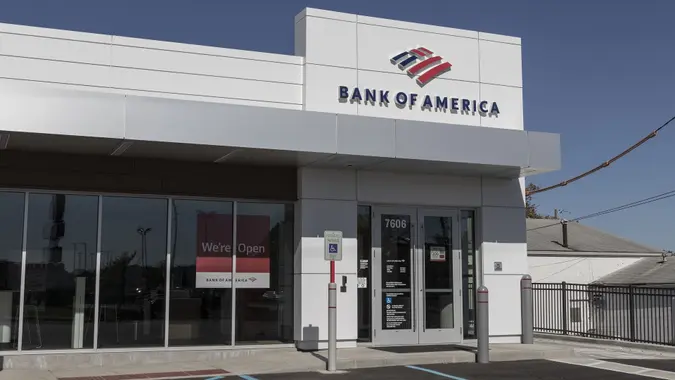Certificate of Deposit (CD): What It Is and Whether It’s Right for You

Commitment to Our Readers
GOBankingRates' editorial team is committed to bringing you unbiased reviews and information. We use data-driven methodologies to evaluate financial products and services - our reviews and ratings are not influenced by advertisers. You can read more about our editorial guidelines and our products and services review methodology.

20 Years
Helping You Live Richer

Reviewed
by Experts

Trusted by
Millions of Readers
With inflation higher than ever, you may be considering how to make more on your money than you get from a typical savings account. Certificates of deposit can be a good option, but they’re not right for everyone.
What Is a Certificate of Deposit (CD)?
A certificate of deposit is a safe, income-generating investment that earns high interest for a set period of time, also known as a term. Because CDs must remain untouched for the agreed-upon length of term, they tend to have higher interest rates to counteract the loss of liquidity.
Typically, a certificate of deposit matures between six months and five years, although CDs are available in a variety of term lengths. CD rates change, so be sure to check current rates before you make your decision.
CD Hot Takes
- CDs typically yield higher interest rates than savings and money market accounts in exchange for leaving the funds untouched for the fixed term length.
- CDs are ideal if you have extra cash that you won’t need for an extended period and want to earn more interest than you would from a money market or savings account without having to risk the principal investment.
- Almost every financial institution, bank or credit union offers a variety of CD options. But be sure to research which place is offering what, since nationally offered CD rates can be three to five times higher than the industry average.
- Compared to more volatile investments such as stocks, CDs are considered safer and more conservative. There may be less reward, but there is less risk with a guaranteed rate of return.
How Certificates of Deposit Work
Once you have done your research and found the right institute with the CD you want to open, there are a few more details you need to know. The bank, brokerage firm or credit union where you open the CD will determine such factors as early withdrawal penalties or automatic reinvestment. The other key components to certificates of deposit are the term, interest rate and the principal.
- Term: The term is the length of time you agree to leave your money deposited in the CD. If you leave your money untouched for the entire term, you will not risk any penalties. Terms can vary in length, so be sure you will be comfortable without those funds for the full duration. When the term ends, the CD has matured, and you can withdraw your money penalty-free.
- Interest rate: The interest rate is the percentage you will earn on your deposit. These rates are locked, which allows you to accurately calculate what your rate of return will be when your CD has matured. Banks cannot change the interest rate once the account is open, making this a comfortably predictable investment.
- Principal: The principal is the amount of money you originally deposit when you open your account.
Choosing a CD Account
First, you’ll need to determine which bank you want to use for your CD account. When considering banks, compare interest rates and maturity times to make sure you’re getting the most out of your CD. Almost all major financial institutions offer CDs. However, terms will vary by location.
Most banks will have a minimum amount you can place into a CD, which can vary with the term of the CD and the interest rate. For instance, a bank might offer:
- A 12-month CD at 1.05% APY; minimum: $5,000
- A 24-month CD at 1.10% APY; minimum: $6,000
- A 36-month CD at 1.15% APY; minimum: $7,000
You’ll decide how much you want to deposit into the CD, open the CD account and then deposit the money. That money will stay locked in for the entire duration of the CD. Once the CD expires, the money will return to you — along with the promised interest.
Depending on which financial institution you bank with, your bank or credit union’s CD products might also be referred to as:
- Term certificates
- Term CDs
- Savings certificates
- Time deposits
A number of different types of CDs are available, as well as various strategies to maximize your earnings. So before you tie up your extra cash in a CD, learn about all the options to find out which CD might be right for you.
How Is a CD Different From a Savings Account?
When debating where to put your money — whether it is in a savings account or a certificate of deposit — it is important to know the subtle differences. Both are considered a safe way to treat your savings, but each has nuances. Where a savings account will allow you to withdraw funds any time you need to, a CD will not let you touch the funds for the entirety of their term under the risk of fees or loss of interest earned.
Withdrawal Restrictions
CDs may charge significant penalties if you take out the money before its maturity date, ranging from a few months’ interest to all of the interest earned.
Savings accounts don’t usually have the same withdrawal restrictions as CDs. You can access the money whenever you’d like, but many banks prohibit more than six transactions of a certain kind each month.
Higher Interest Rates
CDs often pay more in interest, although online savings accounts are becoming quite competitive with CD rates. In many instances, you can earn more by locking your money in a CD than you can by investing in a more liquid savings account.
Keep In Mind
Long-term CDs typically pay higher rates than short-term CDs, but there’s a catch: If rates increase while you’re invested in a long-term CD, you’re essentially stuck with the rate you have until maturity. Although you can take out your money at any time, you’ll get hit with the early withdrawal penalty, which varies from bank to bank.
Why Would You Open a Certificate of Deposit?
CDs can be considered a good investment for those looking for low risks and steady returns. Here are the major benefits of a certificate of deposit:
- Low-Risk: CDs don’t fluctuate. As long as you keep your money in one, you’re guaranteed the interest.
- Government Guarantee: CDs carry insurance of up to $250,000, just like savings and checking accounts.
- Steady Returns: Some CDs pay a very competitive rate, especially when compared with other guaranteed accounts, like savings accounts. You can use a CD rate calculator to compare the options.
As for how much money you should put in a CD, it depends. Limit your investment to the amount you don’t need to keep liquid. While interest rates for CDs are lower in 2022 than they have been in the past, they are still generally higher than interest rates on savings accounts.
However, while CDs are the best option if you want higher interest in exchange for liquidity, high-yield savings accounts may be better if flexibility is important. And if you don’t need liquidity for a while, bonds and stocks may be better yet.
Are CDs Safe?
Like many other financial vehicles, CDs are FDIC insured up to $250,000; you can’t lose money in a CD any more than you can in a savings account. Because they come with a guarantee, they are as safe as a checking account or savings account.
The risk inherent to CDs is that you may need to cash them out before the term expires; if you do so, you could lose a significant amount of the interest you had gained.
What Are the Types of CDs?
Almost as many types of CDs exist as there are types of savers. Use this guide to help narrow your search and find the type of CD that will best suit your financial goals.
Here are some of the types of CDs that are available:
- No-penalty CD: No fee charged for early withdrawal but usually pays a lower interest rate
- High-yield CD: Offers some of the highest interest rates available on the market, but usually with a longer-term
- Jumbo CD: Requires a larger investment — usually $100,000 minimum — but pays higher interest rates
- Bump-up CD: Allows you to bump up to higher market interest rates if rates go up, but usually, only one rate increase is allowed
- Step-up CD: Allows you to lock in your interest rate for a period and your rate will increase over the term
- Brokered CD: Offered by a stockbroker, online brokerage or other investment professionals, with a flat fee or percentage of investment amount often charged
The intricacies of each CD account will depend on the managing institution.
CD Strategies
If you’re looking for a little more bang for your buck when it comes to investing in CDs, consider a CD investment strategy. Rather than simply buying a single CD, you can invest in a range of CDs to help you achieve your investment goals.
Three strategies in particular — the CD ladder, CD barbell and CD bullet — offer different ways to enhance the return on your CDs.
CD Laddering
CD laddering is a way to keep your investment somewhat liquid and can result in higher growth rates.
To create a CD ladder, divide up your total investment into smaller sums, buying CDs of varying terms. For example, instead of buying one CD worth $30,000, you might buy three $10,000 CDs — one each at six-, 12- and 18-month terms. By doing this, one-third of your money becomes liquid every six months.
In addition to added liquidity, this strategy also allows you to maximize interest rates because, upon the second round, you are always investing in longer-term CDs.
- Pros: You can maximize your CD interest rates while still having liquidity.
- Cons: You’ll be locking a lot into CDs, which are still low revenue compared to stocks or bonds.
CD Barbell
Under the CD barbell strategy, you put half your investment into short-term CDs and half into long-term CDs. With this strategy, you’ll have some flexibility with the short-term investments while getting better interest yield with the longer-term accounts. Overall, you’ll get a medium yield average.
- Pros: You maximize interest without sacrificing flexibility.
- Cons: You don’t make as much as you would in solely long-term CDs.
CD Bullet
Another strategy is a CD bullet, in which you buy CDs that have the same maturity date at different times. So, the first year, you buy a 10-year CD, the second year you buy a nine-year CD and so on.
- Pros: You’re able to avoid interest-rate fluctuations.
- Cons: You have to do more management all at once, and you may not make as much as buying longer-term CDs.
Key CD Takeaways
There’s a lot to know about certificates of deposit, so here are the highlights:
- CDs typically offer higher interest rates than most savings accounts.
- In exchange for high interest, CDs require you to keep your money in the bank for a specified term.
- There are a few strategies, such as CD laddering, that can be used to increase the utility of CDs.
- CDs, like saving and checking accounts, are protected by the FDIC.
- CDs are a good investment for you if you are looking to make higher interest on your savings and are good with not touching that money for a fixed amount of time. It is a good way to get a guaranteed rate of return on your deposit.
Explore More on CD Accounts
- How To Open a CD Account in 4 Simple Steps
- How Do CDs Work? Start Stacking Your Savings
- How Much Money Should You Keep in a CD Account?
- What Is a CD Ladder? What You Need To Know
- Pros and Cons of CD Accounts
GOBankingRates’ Best Banks 2023
FAQ
- How much does a $10,000 CD make in a year?
- The amount of money a CD will make in a year depends on the CD rate. For example, if the $10,000 CD was a one-year term with a rate of 1.00% APY, it would earn $100.
- How does a certificate of deposit work?
- A certificate of deposit works much like a savings account. However, you cannot withdraw money from that account for a fixed amount of time. They typically have higher interest rates to make up for the lack of liquidity, but if you try to withdraw funds before the certificate of deposit has matured, you could incur fees or penalties.
- Are CDs a good investment in 2022?
- CDs can be a good investment if you are looking to have a more guaranteed rate of return. Because your interest rate gets locked in once you open the account, there are no surprises. It is considered a less risky investment than a stock or bond.
- What are the benefits of a certificate of deposit?
- The benefits of a certificate of deposit include that they are a safe way to earn interest on your money while actively saving it. Interest rates for CDs are higher because you cannot withdraw the funds until the term has ended and the CD has matured.
Caitlyn Moorhead contributed to the reporting for this article.
Our in-house research team and on-site financial experts work together to create content that’s accurate, impartial, and up to date. We fact-check every single statistic, quote and fact using trusted primary resources to make sure the information we provide is correct. You can learn more about GOBankingRates’ processes and standards in our editorial policy.
- FDIC. "Deposit Insurance - FDIC."
- Investor.gov. "How to save and invest | Investor.gov."
- Federal Reserve. "Reserve Requirements - Federal Reserve."
- The Balance. 2022. "What Is a Barbell CD Strategy?"
- Capital One. 2022. "What is a CD?"
 Written by
Written by  Edited by
Edited by 
























